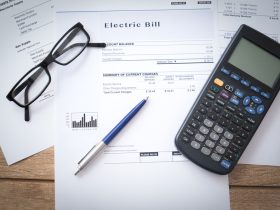The RAC said the average cost of a litre of petrol at UK forecourts rose by 11.6p to end the month at 163.3p
Drivers were hit by the largest monthly spike in pump prices on record in March, despite a cut in fuel duty, according to new analysis.
The RAC said the average cost of a litre of petrol at UK forecourts rose by 11.6p to end the month at 163.3p.
Diesel prices rose even more sharply, up 22.1p per litre to 177.3p.
The previous biggest monthly increases in average fuel prices in records dating back to 2000 were October last year for petrol (7.4p per litre) and May 2008 for diesel (8.4p per litre).
Last month’s increases came despite Chancellor Rishi Sunak implementing a 5p per litre cut in fuel duty on March 23.
That was worth a saving of 6p per litre, owing to the impact on VAT.
The RAC said the rise in pump prices was driven by surging wholesale costs caused by the war in Ukraine, and drivers would have been hit by even higher prices without the cut in fuel duty.
RAC fuel spokesman Simon Williams said: March 2022 will go down in the history books as one of the worst months ever when it comes to pump prices.
Without question, these figures show in the starkest possible terms just how much fuel prices are contributing to the cost-of-living crisis, which will be affecting households up and down the country, he said.
Drivers might well be feeling aggrieved that the Chancellor’s ‘historic’ fuel duty cut announced in the spring statement just two weeks ago has done nothing to protect them from price increases. The fact pump prices have fallen so little reflects the fact that the cost to retailers of buying fuel had been going up ahead of the spring statement, he said.
Meanwhile, figures have revealed that households’ financial wellbeing is at its lowest point in two years, as the surging cost of living hits people’s ability to save.
The Scottish Widows index, which measures households’ overall perceptions of financial wellbeing, fell to an overall score of 38.5 the first three months of 2022.
Readings above 50 in the index indicate an improvement and those below this mark are a sign of deterioration.
The latest score is the lowest recorded by the index since early on in the coronavirus pandemic in the second quarter of 2020, when the score was 37.8.
Of the 40 per cent of households who said they have accumulated additional savings since the Covid-19 pandemic started, nearly three-quarters (73%) expect to have to dip into them in the next 12 months, with 17% expecting to exhaust the full amount.
Rising energy, food, council tax, transport, rent and mortgage bills and a 1.25 percentage point national insurance hike to help pay for health and social care will eat into household incomes.
Emma Watkins, managing director of retirement and longstanding at Scottish Widows, said: It’s tough right now for households trying to manage the surge in day-to-day living costs.
She said: We know that many households have failed to boost their savings during the pandemic (60%) and that over 70% of households will need to eat into their savings in the next 12 months in order to meet their growing expenses.
Data pointed to a rapid decline in the amount of cash UK households had available to spend during the first quarter of the year as higher living expenses bit into disposable income, the report said.
The rate of reduction in cash available was the fastest since the final quarter of 2013, Scottish Widows said.







Leave a Reply